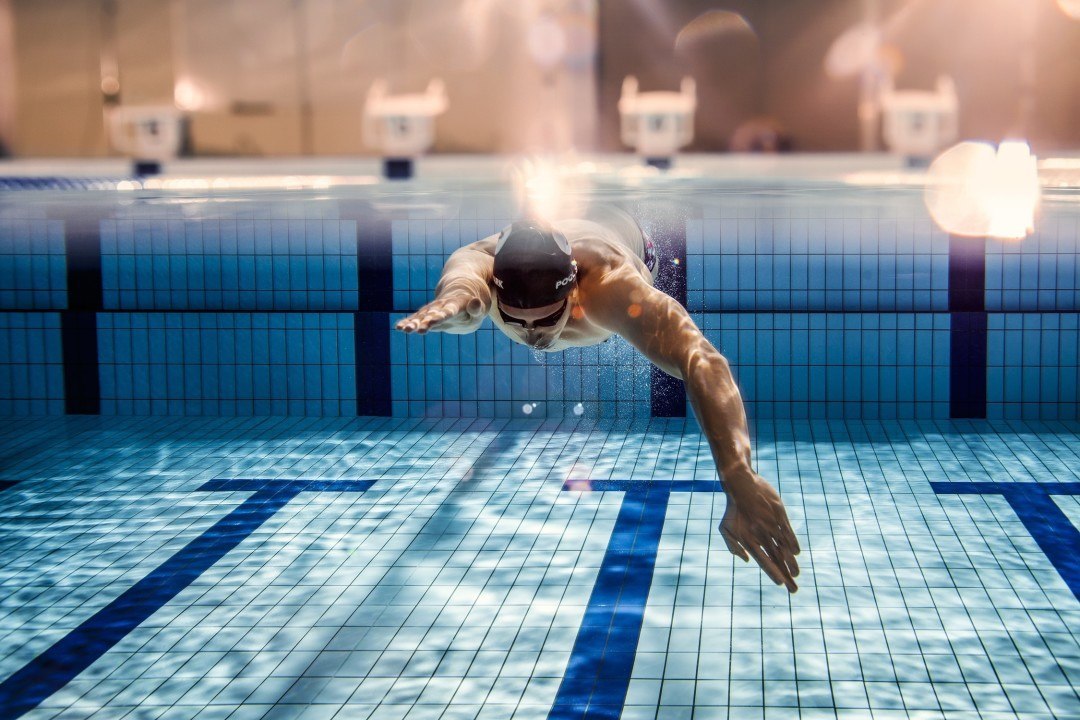Courtesy of Elizabeth Wickham
My kids started swimming with our club team when they were five and seven years old. Looking back, I am not the same swim parent that I was back then—and thank goodness for that! We began our swim adventure in a “mommy and me” class when the kids were infants. Our main concern was water safety because we live in an area with lots of backyard pools. After exposing them to a variety of sports and activities, both chose swimming.
Here are six things I’ve learned from being a swim parent for 15 years:
One
It’s easy to get caught up in your swimmer’s times.
But, it’s not healthy to focus on times. When our son was young, we talked about the next level of times in the swim guide constantly. At a meet, he had a great swim and dropped time, but he missed the goal time we had set and felt like a failure. This was so wrong on our part on so many levels! Most importantly, we learned to never set goals for our kids! It’s their sport, not ours.
Two
Kids improve and learn at different rates.
Kids are all different and it’s pointless to compare them in the pool. If you do, you’ll make yourself unhappy as well as your child—that’s a guarantee. Your swimmer may be the fastest 10 and under, but that may not be the case in later years. Some kids are flat out more talented, while others may have a better work ethic. As a swim parent, step back from comparisons.
Three
Meets are not the be all, end all.
It’s easy to get caught up in the emotions of a swim meet. There can be riveting highs and lows, but in all seriousness, it’s just a meet. Our swimmers may achieve success, and naturally we’re excited for them. If they don’t have a good meet, don’t look at it as a failure, but as a learning experience. Enjoy the excitement of the meet, but remember, it’s not life or death.
Four
Swimming should be fun.
When my daughter was in the 11-12 age group, a wise coach pointed out to me that my daughter swam her best when she was having fun. If she was trying too hard for a certain cut, or felt pressure, she tightened up. Keep the swim experience fun by not putting too much pressure on your kids.
Five
Don’t interrogate your swimmers.
I have an inquisitive mind and I want to know every detail about my kids’ races. I want to know what the coach said, how they felt, if they felt they could do better. Trust me on this one, listen but don’t ask questions. If they feel like talking about practice or a meet, they will share with you on their terms.
Six
I can’t ever say anything right.
No matter how I try to be encouraging, or I try to sympathize, I never get it right. The response I receive is an eye roll and a “Just stop!” Sometimes it’s better to say nothing at all as a swim parent, unless it’s a simple, “I love to watch you swim.”
What lessons have you learned as a swim parent?
 Elizabeth Wickham volunteered for 14 years on her kids’ club team as board member, fundraiser, newsletter editor and “Mrs. meet manager.” She’s a writer with a bachelor of arts degree in editorial journalism from the University of Washington with a long career in public relations, marketing and advertising. Her stories have appeared in newspapers and magazines including the Los Angeles Times, Orange County Parenting and Ladybug. You can read more parenting tips on her blog.
Elizabeth Wickham volunteered for 14 years on her kids’ club team as board member, fundraiser, newsletter editor and “Mrs. meet manager.” She’s a writer with a bachelor of arts degree in editorial journalism from the University of Washington with a long career in public relations, marketing and advertising. Her stories have appeared in newspapers and magazines including the Los Angeles Times, Orange County Parenting and Ladybug. You can read more parenting tips on her blog.


Let parents make these terrible mistakes because nobody will believe you until they’ve done it and regretted it looking back. Everybody who’s agreed here has made your mistakes before realizing their mistake. Parents who live vicariously through their kids will ignore this article, completely. And the reason sports build character is because it forces children to deal with their deranged parents – to deprive children of this experience robs them of an essential character building exercise.
And it robs parents of their own learning moments…
The doctor who Officiates on the weekends and DQs his daughter’s competitors
The self-employed Husband/Wife who tag team as Colorado/Admin Official and “cook the books”, Coach their daughter behind the coachs’ backs, violate presumed confidentiality and intimidate 10yr old competitors
The attorneys who run the Board of Directors giving misinformation to the police who are attempting to serve their Head Coach with Official Court Documents
Grandpa stroke and turn judge who doesn’t call obvious infractions by his grandchild
These are all people who do bad things to good people, including children, and the powers that be say naught.
Spot on: rather than cheer at the top of your lungs in the stands, volunteer as an official and learn to love the sport. Then you have something you can truly share with your swimmers rather than living your unfulfilled aspirations through them. Enjoy them for them. I’ve learn that as a parent of twins.
I have lost so much sleep, I am always thinking what the next meal is before I have prepared the served the first one, my latest perfume is called chlorine, my car has become my new home,my Saturday nights end at 7pm and I have realised that a second I the swimming world is like an hour in the human world. Taper is like winning the lottery, and that the parents who become your friends r you family xx
Should be #1: Stop screaming at them while they swim in races. They can’t hear you, and you only annoy all the other people standing around you. Whistling is no better. Tell them “Good luck” before their race and “Good Job” after. Love them.
Wat if your daughter is the slowest on the team? I always say “Good luck” before and “Someone has to finish last” after her races. It is a reality check for her. I believe in being truthful.
12: Don’t be one of “them”. You know the type, the parent running alongside the edge “cheering” their swimmer on and making a spectacle about how much support then give their swimmer. So embarrassing to watch. My son said if I had ever done that to him he would have quit on the spot to stop the other kids from laughing at him.
Nine: If the coach has zero tolerance for multi-sports participation for 14 and unders you might want to find another program. Too bad they don’t realize that most college programs are actually looking for well rounded athletes that have benefited from conditioning via multiple sports and are less likely to develop overuse injuries as they age.
Ten: Make sure that your young athlete also makes time for school science camps and extra curricular activities.
Eleven: Don’t rearrange family vacations just to please the coach’s training schedule. Family time is important and will be gone before you know it. Remember your swimmer is in middle school!
You could add the following:
Seven: Your eleven year old is unlikely to be going to the Olympics (or even to swim in college), so relax and enjoy the ride.
Eight: If your club coach is suggesting that your 13 year-old do doubles or swim 10,000 yard practices you need to find a new club because there is a 90% chance your swimmer will quit before their senior year in high school.